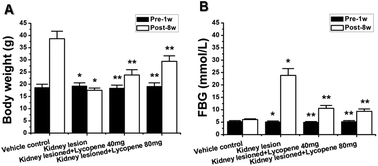Beneficial effect of lycopene on anti-diabetic nephropathy through diminishing inflammatory response and oxidative stress
Abstract
Lycopene is widely used for nutritional supplementation, but the potential benefits in diabetic nephropathy (DN) remains unknown. This study aimed to highlight the therapeutic prospect of lycopene against streptozotocin (STZ)-induced kidney injury in mice. During the process of the experiments, biochemical kits were employed to determine the diabetes-metabolic parameters in STZ-lesioned mice. Routine pathological and ultrastructural observations were screened for the histological changes of kidney tissue. Moreover, immunohistochemical staining was used to investigate the inflammatory conditions expressed in kidney tissue. Furthermore, intrarenal heme oxygenase 1 (HO-1) mRNA level was assayed via RT-PCR and Western blot analyses. The results showed that lycopene alleviated the lesioned signs of DN mice induced by STZ, accompanied with the increase in body weight, reduced serum concentrations of blood sugar and low-density lipoprotein cholesterol (LDL-C), elevated high-density lipoprotein cholesterol (HDL-C) level, and the decrease in urine protein content. In addition, oxidative defense patterns in the kidneys of DN mice were ameliorated, as shown in augmented bioactivities of superoxide dismutase (SOD), glutathione peroxidase (GSH-Px) and in turn lowered malondialdehyde (MDA) content. The immunohistochemical experiment exhibited that lycopene intake contributed to attenuation of nuclear factor-kappa B (NF-κB) and tumor necrosis factor alpha (TNF-α) expressions in kidney tissue. Moreover, intrarenal HO-1 level was up-regulated in the presence of lycopene. Our findings provide the evidence that lycopene protects kidney cells from STZ-induced lesions via inhibiting NF-κB signal pathway for anti-inflammation and attenuating oxidative stress for anti-dysmetabolism.


 Please wait while we load your content...
Please wait while we load your content...